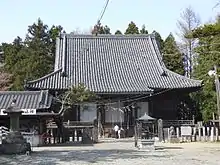Provincial temple
Kokubun-ji (国分寺) were Buddhist temples established in each of the provinces of Japan by Emperor Shōmu during the Nara period (710 – 794).[1]

Mutsu Kokubunji —Yakushido
History
Shōmu (701 – 756?) decreed both a kokubun-ji for monks and a kokubunni-ji (国分尼寺) for nuns to be established in each province. Tōdai-ji, the provincial temple of Yamato Province, served as the head of all kokubun-ji, and Hokke-ji held that duty for the kokubunni-ji.
Modern place names
Modern place names based on this etymology include:
See also
Wikimedia Commons has media related to Kokubunji.
- 735–737 Japanese smallpox epidemic
- Fuchū
- Glossary of Japanese Buddhism
- Ichinomiya (primary shrines of the province)
- Soja shrine (shrines that consolidated the deity for every province)
References
- "Kokubunji". Encyclopedia of Japan. Tokyo: Shogakukan. 2012. Archived from the original on 2007-08-25. Retrieved 2012-05-04.
This article is issued from Wikipedia. The text is licensed under Creative Commons - Attribution - Sharealike. Additional terms may apply for the media files.